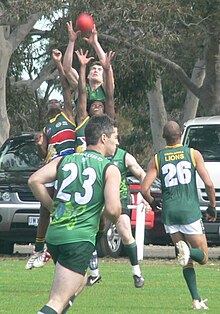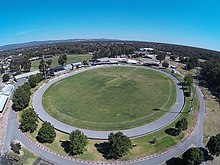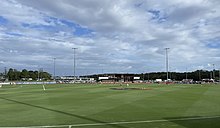Australian Football International Cup
It was the biggest international tournament in the sport that is open to all nations (it is not called a World Cup as Australia does not compete due to the presence of the professional AFL competition and an abundance of semi-professional leagues).
The IC Grand Final of each men's tournament has been held at the Melbourne Cricket Ground as a curtain raiser to an AFL premiership season match.
Despite this, since the 2011 competition, the cup has featured a number of AFL-listed internationals and rookies; however, these players had to first negotiate a release from their AFL/AFLW contracts before being nominated and are not paid for their appearances.
However, in 1999 a proposal was received from the New Zealand Australian Football League (NZAFL), suggesting that the World Cup be brought forward to 2002.
The inaugural competition, the 2002 Australian Football International Cup, was held between 14 August and 23 August 2002 (in conjunction with the International Australian Football Council), with eleven countries competing including Canada, Denmark, Ireland, Japan, Nauru, New Zealand, Papua New Guinea, Samoa, South Africa, the United Kingdom, and the United States.
All matches were played in Melbourne at mainly second tier suburban and Victorian Football League home grounds.
The third cup in 2008 saw a record sixteen nations with China, India, Sweden, Finland and a combined Israel-Palestine side (known as the Peres Peace Team) debuting.
The fourth tournament, the 2011 Australian Football International Cup, was the first to play matches outside of Victoria, with Sydney being billed as co-host.
It was also the first tournament to be split into divisions, seeded from an opening round lighting-style format similar to the 2011 NAB Cup.
The 2017 Australian Football International Cup once again featured eighteen men's teams, including debutante Sri Lanka, reflecting the game's growth in the Indian subcontinent.
[19] AFL Canada was announced as host of the Transatlantic Cup to be held at the Humber College Oval at Colonel Samuel Smith Park in Toronto on August 2-11,[20] The Maroochydore Multi Sports Complex on the Sunshine Coast, Queensland was announced as the host of the Pacific Cup on 14-24 November.
[21] Thanh Long Sports Center in Vietnam would host the Asia Cup at in Ho Chi Minh City from December 6-8 in 2024.
Since the 2011 Australian Football International Cup the Men's competition has been split into two Divisions, with the format differing from each past edition.
The AFL had, for the first time, announced capping the men's competition to sixteen teams and the women's to eight; however no system for qualification has been proposed.
The tournament is geared towards development of the sport outside Australia and as such player eligibility rules are much more strict than those of other international football competitions.
No senior AFL players on contracts have yet been released to play in the International Cup, like most amateur representative competitions, this is primarily due to the risk of injury.
The United States Australian Football League also provided video coverage and recorded a documentary on its participation.
The AFL failed to secure a broadcast partner for the 2011 tournament, instead adding delayed highlights to their online video service.
For the 2017 tournament the AFL partnered with Internet service YouTube to provide live streaming of the three rounds held at Royal Park and the two Grand Finals.
The USAFL, AFL Canada, World Footy News, and the Eastern Football League provided supplementary coverage of the school and community rounds.
IC coverage was not included in the AFL's record breaking 2.5 billion broadcasting deal in 2015[32] or contract negotiations in 2019 for the 2020 extension, though Kayo will stream AFLW matches.
The West Australian Football League expressed an interest in bidding for the 2008 cup to go to Perth, Western Australia[35] however the AFL did not open up hosting to bidders and the tournament was held in Victoria instead.
The cancelled 2020 tournament was the first time in the history of the event that the AFL opened up to bidders as part of a closed bidding process.
Among newly introduced criteria was that the grounds must meet the AFL's Preferred Facility Guidelines at Regional level to qualify.
The result was selection between two bids, a Ballarat, Victoria bid to hold matches at the Eureka Stadium precinct and adjoining ovals North Oval No.2 (which underwent a total $38.5 million in upgrades to meet AFL standard criteria from 2016-2020) and a Sunshine Coast, Queensland bid backed by the Queensland government in partnership with Tourism and Events Queensland and Sunshine Coast Council to hold matches at the Maroochydore Multi Sports Complex (which underwent a total $5.8 million in upgrades to meet the AFL standard criteria in 2019-2020).
Though Essendon did not recruit Sakaki, he received an invitation to AFL Draft Camp and the exposure was a catalyst for the Wodonga Raiders club contracting him to play semi-professionally in the strong Ovens & Murray league in 2006.
For underaged international players the IC provides an alternative pathway and the opportunity to prove their ability to compete at a high senior level.
IC players from PNG finding their way to AFL clubs have included Amua Pirika,[41] Hewago Oea (both debuted for the senior Papua New Guinea team when under 17 years old) and Stanis Susuve at the Gold Coast, Theo Gavuri at the GWS Giants and John James Lavai, Brendan Beno and David Meli at the Brisbane Lions.
IC players from other countries to have been recruited to play professionally include Padraig Lucey (Ireland) at Geelong Football Club,[42] Joe Baker-Thomas (New Zealand) at St Kilda Football Club,[43] Yoshi Harris (Nauru) at GWS Giants, and Kendra Heil (Canada) at Collingwood.


